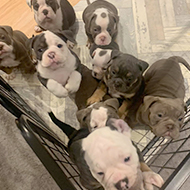
Demand for pets in lockdown leads to 170 per cent rise in dog theft cases.
Following a rise in reports of pet thefts, police are encouraging dog owners to take reasonable security measures to ensure that their pets are safe.
According to the charity DogLost, reports of pet theft have increased by 170 per cent in the last year, from 172 dogs in 2019 to 465 in 2020.
Deputy chief constable Amanda Blakeman, who is the National Police Chiefs’ Council (NPCC) lead for acquisitive crime, said: “Dog theft can be a devastating crime for families and causes considerable distress to owners. Whilst it is still a very rare crime, it’s sadly something we have seen increasing recently.
“During the Coronavirus pandemic criminals have adjusted their activities and are taking advantage of the big demand for pets over the lockdown period. The cost of a puppy has considerably increased over the past year making this a lucrative market for organised criminals to exploit.”
NPCC has directed pet owners to the Blue Cross website, which has a wide range of advice on how to prevent theft of dogs and what to do if it happens.
The police also encouraged those who are buying dogs to fully consider where the pet may have come from and ensure that it is being purchased legally.
Policing minister Kit Malthouse said: “Losing a much loved family pet can cause great distress and it’s a sad fact that criminals will seek to profit by this vile crime.
“We are taking action to cut crime by bolstering the police with 20,000 extra officers and our £20 million Safer Streets Fund will provide Police and Crime Commissioners with additional cash to spend on crimes such as theft.”
Images (c) Dyfed Powys Police & GMP.



 RCVS Knowledge has called on vet practices to audit their post-operative neutering outcomes.
RCVS Knowledge has called on vet practices to audit their post-operative neutering outcomes.